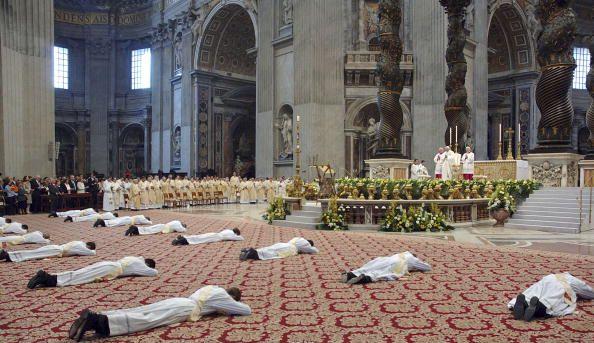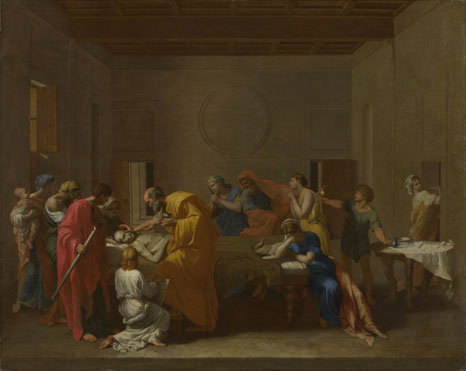
After introducing the problem in my
previous post, I'd like to bring up what strikes me most about Nicea and the way that this council has a view that does not comport with Protestantism. Many Catholics have gone about this debate by centering their thoughts on some of the final clauses of the Creed, and if I have the time I may conclude by stressing that to really believe in one baptism for the remission of sins, and a Church that is One, Holy, Catholic, and Apostolic does not match the typical Protestant view of the Church, but I think that the context surrounding this Creed is even more compelling.
For you see, this council is indeed the point where Arianism was repudiated and the deity of Christ was upheld, in that great distinction which was made between homoousion (the same essence as that of the Father) and homoiousion (a similar essence as that of the Father's). But it was not merely a council that discussed this matter of who Jesus is and his relationship to the Father.
Not only was there a Creed that was written and approved at Nicea, there was also a set of Canons (or rules) about Church behavior and polity. It is these Canons about which I found myself both greatly amazed and instructed in history as I read them recently. It was so encouraging to see that my faith as a Catholic was upheld historically in the very first Council. But then, I'm getting ahead of myself, as usual.
So, the first Ecumenical Council met, and it didn't just make a Creed. It also set out to write some Canons. We can imagine a hush in that ancient hall, and what will be decreed in the First Canon? If you guessed a further condemnation of Arianism, you would be wrong. In fact, if you randomly were to guess the right answer I would ask you to go to a grocery store and buy me some lottery tickets. This first Canon at the first Council states the following:
If any one in sickness has been subjected by physicians to a surgical operation, or if he has been castrated by barbarians, let him remain among the clergy; but, if any one in sound health has castrated himself, it behooves that such an one, if [already] enrolled among the clergy, should cease [from his ministry], and that from henceforth no such person should be promoted. But, as it is evident that this is said of those who wilfully do the thing and presume to castrate themselves, so if any have been made eunuchs by barbarians, or by their masters, and should otherwise be found worthy, such men the Canon admits to the clergy.
First and foremost, I was shocked to read that this act of self-mutilation was not a random blip confined only to the life of
Origen, the early Church Father who had some strange views at times.
This phenomenon was actually frequent enough that the Fathers of Nicea had to speak out against it and say that those men should not be in the ministry! If only our age erred in that realm in that area, versus the dominance that lust plays in the Church and outside of Her doors. But that's another story for another time.
Going beyond that, it really strikes me that this first Canon is considering the treatment of eunuchs and how they, if not self-mutilated, can be a member of the clergy. Why discuss this, if being a pastor "requires" that the man who is ordained must be the husband of one wife?
Instead, there is the assumption that there should be a place for men who live as celibates. And why do you think some people had castrated themselves? It's simple logic to see that some men wanted to be in ministry and could not imagine living a chaste life without this mutilation taking place. Now, many married men may think this to be so, but in the midst of all this consideration which may seem too theoretical, some simple words from Our Lord come to mind:
For there are eunuchs, which were so born from their mother's womb: and there are eunuchs, which were made eunuchs by men: and there are eunuchs, which made themselves eunuchs for the kingdom of heaven's sake. He that is able to receive it, let him receive it. (Matthew 19:12)
Now, perhaps some of our 4th century Christian friends had taken this passage literally? Maybe that's why there were some people who had castrated themselves? This may especially be true if also they took Christ's words about cutting things off that cause one to sin literally, but the point is that this Canon shows that that is not what Christ meant. To make one's self a eunuch for the Kingdom of heaven is instead an interior act of devotion to God above any earthly affections. That there would be some celibate men in the priesthood or serving as bishops/deacons/etc. is clearly presupposed by this Canon.
And yet, as I've asked many friends, I cannot find a local Evangelical or Reformed congregation where Pastor so and so has decided to live a celibate life in dedication to God. Instead, such a man would be suspect as being somewhat freakish. Even an unmarried pastor who has the intention of finding a godly wife is suspect. I'm not saying that all priests should be celibate (and indeed, there are married priests in Eastern Catholic and Eastern Orthodox Churches, as well as some rare exceptions to the rule when Anglican priests and others convert to Roman Catholicism), but the more I have considered this canon, the more it has been clear that a significant portion of men in the ministry were celibate.
The first Canon of Nicea takes it for granted that there are these men who are eunuchs for the sake of God, and welcomes those men who have been mutilated by others into the ministry. That just sounds far too Catholic for my former Protestant ears. Am I alone?
At this point you may be asking, "So what? So what if this council was completely different in its thinking from my way of thinking?"
The significance of this issue includes these facts:
1) If the Protestant view is right and the view of Nicea is wrong, that means that the Church was already corrupt in its first big meeting after the Scriptures were written.
2) This writing goes presupposes a view held by Catholics and Orthodox, who also stress their connection to the Apostles in terms of apostolic succession.
3) It raises the question of why this issue of celibacy even seems strange, given the passage in the Gospel mentioned above.
Or maybe you're hoping that this dissonance between Protestant thinking and Nicene thinking as seen in Canon I isn't really that big of a deal, and this first canon is just an aberration. As my next post will show, the lack of harmony between the Christian community of 325 and its Protestant counterparts today cuts even deeper than this issue of celibacy.











